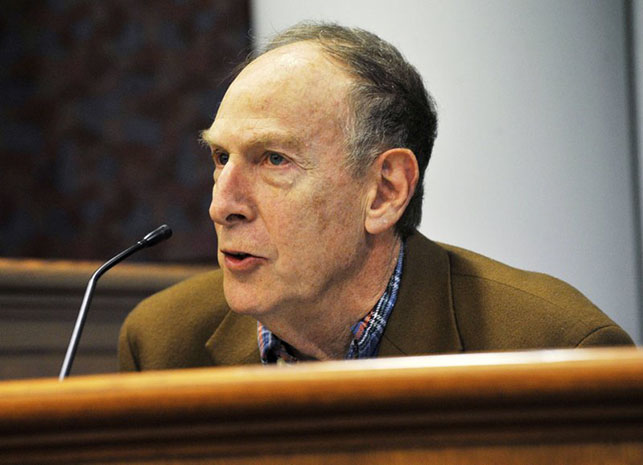

Len Levitt, reporter who dug into Moxley case, dies at 79
By MICHAEL R. SISAK and TOM HAYS
May 18, 2020
 In this April 22, 2013, file photo, Leonard Levitt, author of the book "Solving the Moxley Murder: A Reporter and Detective's Twenty-Year Search for Justice," testifies at Michael Skakel's habeas corpus trial at Rockville Superior Court in Vernon, Conn. Levitt, a longtime New York City crime reporter known for his incisive writing on the inner workings of policing and dogged coverage that helped re-open the investigation into the Connecticut killing of Martha Moxley, has died at 79. He died Monday, May 18, 2020, at his Stamford, Connecticut, home of lung cancer complications, said his daughter, Jennifer. (Jason Rearick/Hearst Connecticut Media via AP, Pool, File)
In this April 22, 2013, file photo, Leonard Levitt, author of the book "Solving the Moxley Murder: A Reporter and Detective's Twenty-Year Search for Justice," testifies at Michael Skakel's habeas corpus trial at Rockville Superior Court in Vernon, Conn. Levitt, a longtime New York City crime reporter known for his incisive writing on the inner workings of policing and dogged coverage that helped re-open the investigation into the Connecticut killing of Martha Moxley, has died at 79. He died Monday, May 18, 2020, at his Stamford, Connecticut, home of lung cancer complications, said his daughter, Jennifer. (Jason Rearick/Hearst Connecticut Media via AP, Pool, File)
NEW YORK (AP) — Leonard Levitt, a longtime New York City crime reporter known for his incisive writing on the inner workings of policing and dogged coverage that helped re-open the investigation into the Connecticut killing of Martha Moxley, has died at 79.
Levitt died Monday at his Stamford, Connecticut, home of lung cancer complications, said his daughter, Jennifer. Friends, colleagues and even some of Levitt’s targets remembered him as a one-of-a-kind journalist who brought integrity and depth to his reporting — and zero tolerance for people who hid the truth.
“He was a thorn in the side of authority,” said Richard Esposito, the police department’s chief spokesman, who reported alongside Levitt at Newsday in the 1980s.
Former Police Commissioner Ray Kelly was so frustrated with Levitt’s critical coverage, Levitt said he went to Newsday’s Long Island newsroom in 2003 to complain. A few years later, Levitt was effectively banned from police headquarters when the NYPD declined to renew his press credentials, prompting Levitt to sue to get them restored.
John Miller, a former reporter who is the NYPD’s top counterterrorism official, said Levitt had a “passive contempt for power.”
“He was in contact with a lot of powerful people — in law enforcement, in government, among prosecutors — but eventually when they crossed into the sites of his column, he spared no one,” Miller said. “And that circles back to integrity.”
A journalist for the better part of six decades, Levitt kept working after his March 2018 cancer diagnosis, showing up to news conferences, pressing police officials for answers and publishing his findings in his weekly column, “NYPD Confidential.”
The often revelatory online column — the most recent incarnation of the “One Police Plaza” column Levitt wrote for Newsday from 1995 to 2005 — remained a must-read for police officers, fellow scribes and the public through to its final edition, last December.
“It was impossible not to learn from Len,” said Rocco Parascandola, the police bureau chief for the New York Daily News, who worked with Levitt at Newsday in the 2000s.
“He always looked at police coverage through a larger prism — how policies, practices and politics impacted how cops did their jobs. No controversy, no major incident, ever played out in a vacuum, he felt,” said Parascandola. “He was right — and if you worked with him you picked up on that and started looking at the bigger picture.”
Born in the Bronx and raised on Long Island, Levitt started in journalism as a part-time sportswriter for the Long Island Press after college at Darmouth, two years in the Peace Corps teaching English in Tanzania and Columbia Journalism School.
He reported for The Associated Press in New York and, after detouring to report for the Detroit News, returned to the city as a correspondent for Time. He went to Newsday in 1975, covering police on Long Island, and returned in the mid-1980s to cover the NYPD for the newspaper’s since-folded New York City edition.
Aside from his coverage of the police department, Levitt is perhaps best known for his work digging into Moxley’s death. His reporting on the 1976 killing of the Greenwich teenager led authorities to revisit the case and charge Kennedy cousin Michael Skakel with murder.
Levitt wrote about the Moxley case in “Conviction,” one of six books he authored. The others include: “An African Season: The Long Way Round,” about his time in Tanzania, “The Healer,” “The Brothers of Attica,” and “NYPD Confidential.”
Levitt and his wife, Susan, were married for 46 years. In addition to Jennifer, they had a son, Michael, and a granddaughter, Amaia — all of whom were by his side as he died.
Jennifer Levitt said her father was a “fabulous dad,” who regularly played driveway basketball or backyard football with the kids and enjoyed weekend trips to regional tournaments to watch her play softball and Michael play soccer.
Over the last few days, as Levitt neared his end, his family received heartfelt messages from former colleagues speaking to his passion for reporting, his commitment to the truth and his kindness and generosity towards younger reporters, Jennifer Levitt said.
Esposito, once one of those younger reporters, put it plainly: “There aren’t enough journalists like Lenny Levitt.”
Read more obituaries or go to complete archive of articles.